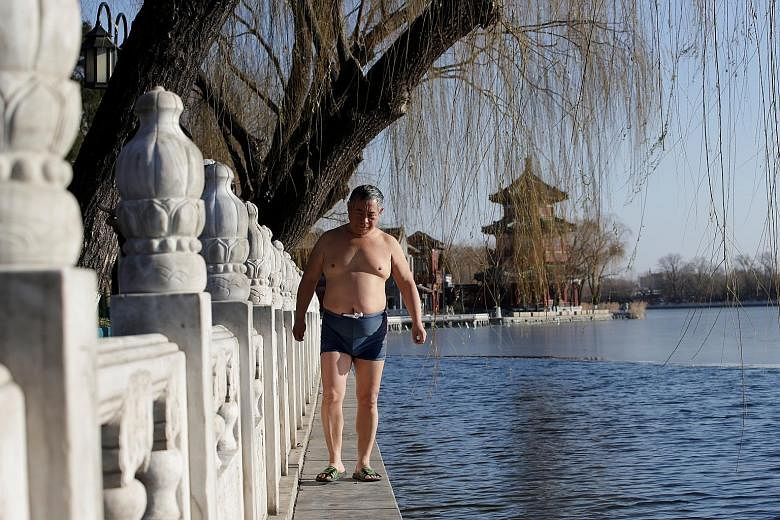BEIJING • Blue skies returned yesterday after winds dispelled dangerously high levels of air pollution that had blanketed the Chinese capital for five days and prompted a pollution red alert.
The respite, however, is expected to be short-lived as the air quality in northern China is forecast to deteriorate again tomorrow before improving on Monday.
The Air Quality Index (AQI) in Beijing dropped to about 50 yesterday morning after spiking to more than 400 overnight.
The Beijing city government said it had lifted the red alert that was in place since last Friday, meaning emergency restrictions on vehicle use and construction would end.
But high readings are still being recorded in other parts of northern China, including Hebei province and parts of Tianjin. Shijiazhuang remained on red alert as grey skies continued to cast a pall over Hebei's capital. Earlier this week, the AQI in the city was above 500 for more than two days.
Since the weekend, 24 cities had issued red alerts, and the pollution had disrupted flights, traffic and shipping, and closed factories and schools across northern China. Flights have resumed in Beijing, Shijiazhuang and Tianjin.
A red alert is the highest level of a four-tier warning system. Red alerts are issued when the AQI is forecast to exceed 200 for more than four days in a row, 300 for more than two days, or 500 for at least 24 hours.
As many as half a billion people in China were affected in the latest episode of severe smog in the country, which is also its worst this year.
A recently published study has found that smog is related to nearly one-third of deaths in China, reported South China Morning Post (SCMP) yesterday.
Researchers from Nanjing University's School of the Environment looked into more than three million deaths in 74 cities in the Beijing-Tianjin-Hebei region, and the Yangtze River Delta and Pearl River Delta in 2013. They found that 31.8 per cent of the deaths could be linked to PM2.5 pollutants, tiny particles that are especially hazardous.
The findings were published in the November edition of the Science of the Total Environment journal.
Baoding, Shijiazhuang and Handan - the cities with the worst air pollution - each reported more than 30,000 smog-related deaths in 2013.
Analysts have warned that the latest "airpocalypse" could turn into a public policy crisis for top leaders.
China has managed such crises before, including a cover-up of the severe acute respiratory syndrome (Sars) epidemic in 2003, but the smog problem affects far more people than any previous public crisis.
Professor Hu Xingdou from the Beijing Institute of Technology said the smog is a symbol of the country's "irresponsible bureaucratic apparatus", which he added is blind to reality and deaf to public opinion.
"Cadres are trained to pursue economic growth, and they don't really care about smog," he told SCMP. "In fact, they are trying very hard to silence people's voices over smog."
The country's northern provinces mostly rely on the burning of hundreds of millions of tonnes of coal each year for heating.
Natural gas and electricity can be substitutes for coal, President Xi Jinping said at a government meeting on Wednesday, reported Xinhua news agency. Clean energy should be used as much as possible, he said, adding that the government will give enterprises a major role in the process to ensure heating is affordable.
REUTERS

